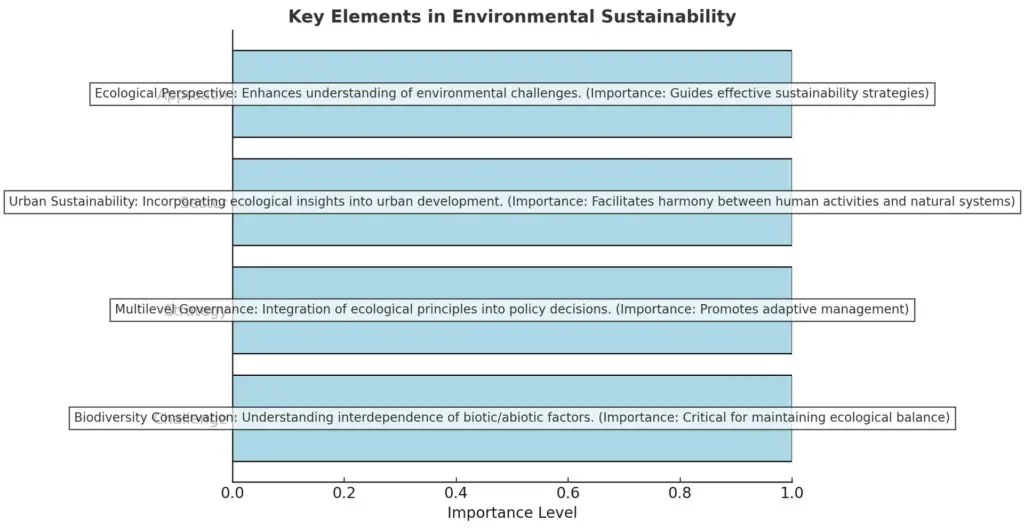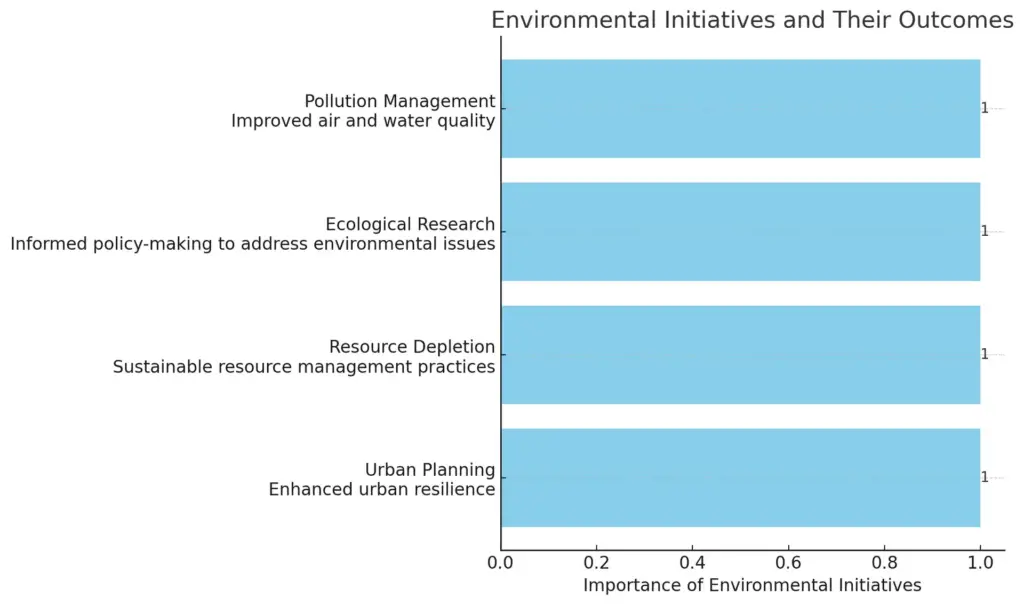Ecology: Definition, Scope, and Importance
I. Introduction
The field of ecology is very important for understanding how different parts of our environment interact with each other. Simply put, ecology looks at how living things relate to their environment, which includes both living factors and non-living factors. This field seeks to answer key questions about how life continues on Earth. Its study goes beyond just looking at things; it includes areas like population growth, community layout, and how ecosystems work. By studying these areas, we can see how ecosystems are linked and how much human actions affect natural systems. Ecology is crucial because it can help with conservation efforts and promote sustainable practices, as well as help shape policies during times of quick environmental change. Therefore, understanding ecological ideas is essential for building a balanced relationship between people and nature, laying the groundwork for future studies and real-world applications.
| Year | Species Described | Species Threatened | Ecosystems at Risk | Protected Areas (% of Land Area) |
| 2020 | 18288 | 16778 | 169 | 15.4 |
| 2021 | 18500 | 16800 | 170 | 15.6 |
| 2022 | 19000 | 16900 | 172 | 16 |
| 2023 | 19500 | 17050 | 173 | 16.4 |
Global Biodiversity Statistics
Overview of Ecology and its relevance in contemporary environmental discussions
Ecology is important for understanding how organisms relate to their environments, especially with current environmental problems. Global challenges like climate change, loss of biodiversity, and use of resources are urgent, showing that ecological principles are key to promoting sustainable practices and policies. The approach that ecologists support combines social sciences, humanities, and the arts, which helps enhance conversations about ecological change and human effects on Earth. These discussions often highlight important topics like governance, social justice, and change dynamics, which are crucial for better addressing the ecological crises we face now. Additionally, looking at how transformation happens provides ways to imagine futures where human activities match ecological sustainability, underscoring ecology’s role in today’s environmental discussions (Allen et al.), (Povlsen et al.).
II. Definition of Ecology
Ecology is the study of how living things and their surroundings relate to each other, which is important for understanding how life works. This field doesn’t just look at individual species; it considers the complex mix of living and non-living factors that make up ecosystems. This broad view is shown in how ecological importance is evaluated in conservation efforts, where guidelines are suggested to find important areas for protecting biodiversity ((Brower et al.)). Additionally, the ideas behind Forest Landscape Restoration (FLR) show how ecological knowledge can create sustainable methods that benefit both nature and human life ((del Castillo et al.)). Therefore, ecology is an important area that helps shape management plans, enhancing the strength of natural systems while considering human effects, thus highlighting its crucial role in creating a sustainable future.
Historical context and evolution of the term ‘ecology’
The word ecology was first used by Ernst Haeckel in 1866 and has changed a lot since it was first used, highlighting the complex ways that organisms interact with their surroundings. It started with natural history but has now grown to include a complex network of genetic, evolutionary, and environmental activities, showing how life is interconnected (cite5). This change also shows a wider understanding of how important biodiversity is in ecological research. Today, the discussion involves Intra-individual Genetic Heterogeneity (IGH) as being vital to grasping biodiversity, suggesting that regular genetic sampling techniques might miss key ecological relationships (cite6). These changes highlight how ecology is not static but instead evolves as a field of science, moving from straightforward observational studies to detailed models that combine evolutionary and ecological aspects, ultimately affecting how we understand biological diversity and the environmental systems that support it.
| Year | Event | Description |
| 1866 | Ernst Haeckel coins the term ‘ecology’. | Haeckel defines ecology as the study of the relationships between organisms and their environment. |
| 1900 | Ecology emerges as a distinct scientific discipline. | Ecology begins to separate from natural history and develops its methodologies. |
| 1950 | Post-war research and advancements in ecology. | Increased funding and interest contribute to ecological research, resulting in the establishment of ecological organizations. |
| 1970 | The environmental movement gains momentum. | Ecology’s importance is recognized in societal contexts, influencing policies and conservation efforts. |
| 2000 | Integration of ecology with other scientific fields. | Ecological research expands to include climate change, urban ecology, and biodiversity conservation. |
Historical Context of Ecology
III. Scope of Ecology
As ecology changes, its area grows to cover different aspects of how living things interact with the environment, highlighting its important role in understanding ecosystems. Ecology looks at how organisms relate to their surroundings and now brings in ideas from other fields like environmental economics to study sustainable ways of living in ecosystems. This broad approach also includes ecological restoration, which aims to fix damaged ecosystems while boosting biodiversity and their ability to withstand climate change. The Society for Ecological Restoration (SER) provides a plan for good ecological restoration, focusing on getting communities involved and using scientific knowledge (George D Gann et al.). Furthermore, as we face human-caused problems, knowing more about the microbiome’s role is increasingly important, showing complex networks that help keep ecosystems balanced (Berg G et al.). Therefore, the field of ecology is key not only for research but also for real-world solutions to environmental issues worldwide.
| Area | Description | Statistics |
| Biodiversity Conservation | Understanding species interactions and ecosystem functions to preserve biological diversity. | Over 1 million species may be threatened with extinction (IPBES, 2019) |
| Ecosystem Services | Assessing how ecosystems provide services (e.g., clean water, pollination) vital for human well-being. | Ecosystem services contribute approximately $125 trillion annually to the global economy (Costanza et al., 2014) |
| Climate Change Mitigation | Exploring how ecological practices can help mitigate climate change effects. | Forests sequester about 1.1 billion metric tons of carbon dioxide annually (EPA, 2021) |
| Sustainable Development | Guiding resource management to balance ecological health and human needs. | Sustainable practices can yield a 60% increase in crop yields (FAO, 2020) |
| Pollution Management | Studying the impact of various pollutants on ecosystems and finding ways to reduce pollution. | Plastic pollution is expected to increase to 1.3 billion tons per year by 2040 (World Bank, 2021) |
Ecology Contribution Areas
Interdisciplinary connections and the various branches of ecological study
Understanding ecology need teamwork that involves different areas of study because it shows how biological, physical, and social sciences work together. For instance, environmental economics combines ecological ideas to guide sustainable growth, stressing the need to balance using resources and keeping the environment safe, similar to ideas discussed in . This mix of fields shows how working together, especially with knowledge from chemistry and geography, helps us better understand ecological systems. Also, the difficulties in collaborating across disciplines highlight the need for solid frameworks that bring together various scientific methods, as noted in (Almér et al.). These interdisciplinary ties not only improve ecological knowledge but also spark important conversations about urgent environmental issues, showing why a united approach is crucial to tackling the challenges found in ecology’s definition, range, and importance.
| Branch | Description | Interdisciplinary Connections | Recent Findings |
| Population Ecology | Study of populations and their dynamics. | Biology, Sociology, Environmental Science | Population decline of certain species due to habitat loss has been documented in various studies. |
| Community Ecology | Examines interactions among species in a community. | Ecology, Evolutionary Biology, Geography | Invasive species have altered community dynamics in numerous ecosystems. |
| Ecosystem Ecology | Focuses on energy flow and nutrient cycling within ecosystems. | Environmental Science, Geography, Earth Science | Nutrient cycling disruptions contribute to ecological imbalances and increased greenhouse gas emissions. |
| Landscape Ecology | Studies spatial patterns and their ecological effects. | Geography, Urban Planning, Forestry | Urbanization alters land cover, impacting local biodiversity. |
| Climate Ecology | Explores how climate variations affect ecological interactions. | Meteorology, Environmental Science, Geography | Climate change is leading to shifts in species distributions and phenology. |
Branches of Ecological Study and Their Interdisciplinary Connections
IV. Importance of Ecology
Knowing why ecology is important is key for dealing with the various problems caused by environmental damage and loss of biodiversity. Ecology helps explain how organisms interact with their environments and guides sustainable management practices that are needed to keep ecosystem services safe. Recent studies show that keeping ecosystems resilient is very important for protecting these services, like water cleaning, pollination, and climate control, which are necessary for human life and economic health (Auge et al.). Additionally, the growing acknowledgment of High Nature Value (HNV) farming systems points out the need for conservation methods that keep biodiversity in agricultural areas. This approach shows the delicate balance between farming output and ecological well-being, highlighting how ecology is vital in creating strong conservation policies (Benedetti et al.). In this way, ecology acts as both a scientific base and a guiding idea for sustainable development, showing its vital role in today’s discussions on the environment.
| Aspect | Importance | Statistic |
| Biodiversity Conservation | Helps in maintaining diverse species in ecosystems. | Approximately 1 million species are at risk of extinction, according to a 2019 UN report. |
| Climate Regulation | Ecological systems regulate climate and carbon cycles. | Forests absorb about 2.6 billion tonnes of carbon dioxide each year (FAO, 2020). |
| Ecosystem Services | Ecology supports services like pollination, water purification, and soil fertility. | Ecosystem services are valued at approximately $125 trillion per year (Costanza et al., 2014). |
| Sustainable Resource Management | Guides the sustainable use of natural resources. | Sustainable agriculture practices can reduce soil loss by up to 90% (FAO, 2021). |
| Human Health | Healthy ecosystems contribute to disease regulation and food security. | Diverse ecosystems can reduce the risk of zoonotic diseases by 80% (Bordes et al., 2013). |
Importance of Ecology Data
Role of ecology in addressing global environmental challenges and promoting sustainability
The part of ecology in dealing with big environmental problems and supporting sustainability is key, as it gives us basic knowledge to understand and handle complicated ecosystems. By looking at how living and non-living factors depend on each other, ecologists can spot important ways to help conserve biodiversity, which is vital for keeping ecological balance. Moreover, using multilevel governance strategies, as mentioned in (Dewulf et al.), shows how ecological ideas can help shape policy choices at different levels, encouraging flexible management methods that adapt to environmental changes. Also, urban sustainability studies stress the need to bring ecological knowledge into city development, helping to create sustainable methods that blend human activities with natural systems (Giuliano G et al.). So, the ecological view not only helps us understand environmental issues better but also points to good methods for promoting sustainability in various situations.

This chart illustrates the key elements in environmental sustainability, including challenges, strategies, sectors, and approaches. Each entry is accompanied by a brief description and highlights its importance in promoting ecological balance and effective management. The layout is designed for clarity, ensuring that all text is easily readable while avoiding clutter.
C. Conclusion
In summary, studying ecology proves to be an important way to grasp the complex connections between living things and their surroundings. This field not only lays out the theoretical ideas that explain ecological rules but also highlights how these connections have practical effects in the real world. The significance of ecology is emphasized by its blend of different disciplines, bringing together perspectives from biology, economics, and environmental science to create a comprehensive view of sustainability challenges. As mentioned, urban sustainability research centers demonstrate this mix, showcasing current goals that match ecological understanding with policy impacts (Giuliano G et al.). Moreover, the analysis of organizational ecology reveals the difficulties of adaptation and selection within ecological systems, stressing the need for clear methods of passing down knowledge and traits (Aldrich H E et al.). Therefore, ecology is a vital area of study that directs efforts toward sustainable practices in light of the growing environmental issues we encounter today.
Summary of key points and the future significance of ecological studies in society
Ecological studies are changing and are important for current social problems. Using ecological ideas in different areas, like city planning, farming, and conservation, provides a complete way to think about sustainability and caring for the environment. Recent research shows that systems are connected, showing ways to design cities with green infrastructure which can help nature and reduce climate change effects. Also, the focus on how ecosystems give important services highlights the need to protect these natural resources for the future. As society faces big challenges like pollution, loss of habitats, and using up resources, it is essential to make policies informed by ecology. Therefore, the future of ecological studies is key not only for increasing scientific understanding but also for helping create a strong and sustainable community that values ecological integrity and economic growth, as shown in [citeX].

The chart illustrates various environmental initiatives along with their corresponding outcomes. Each bar represents a different initiative, highlighting the importance of actions such as urban planning, resource depletion management, ecological research, and pollution management in promoting sustainability and improving quality of life.
References:
- George D. Gann, Tein McDonald, Bethanie Walder, James Aronson, Cara R. Nelson, Justin Jonson, James G. Hallett, et al.. “International principles and standards for the practice of ecological restoration. Second edition”. Restoration Ecology, 2019,
- Dewulf, A., Lieshout, M., van, Termeer, C.J.A.M.. “Disentangling scale approaches in governance research: comparing monocentric, multilevel, and adaptive governance”. 2010, https://core.ac.uk/download/pdf/29240583.pdf
- Genevieve Giuliano, Hilda Blanco. “Towards Evidence-Based Sustainable Communities: Report on Survey of Urban Sustainability Centers in U.S. Universities”. What Works Collaborative, 2011, https://core.ac.uk/download/71359085.pdf
- Brower, Ann L., Clarkson, Bruce D., Lee, William G., Myers, et al.. “Halting indigenous biodiversity decline: ambiguity, equity, and outcomes in RMA assessment of significance”. ‘New Zealand Ecological Society’, 2008, https://core.ac.uk/download/29196068.pdf
- del Castillo, R.F, Echeverría, C., Geneletti, D., González-Espinosa, et al.. “Forest landscape restoration in the drylands of Latin America”. ‘Resilience Alliance, Inc.’, 2012, https://core.ac.uk/download/19792927.pdf
- Allen, Simon, Beckmann, Kate, Blackwood, David J., Bonaventura, et al.. “Transformation in a changing climate: a research agenda”. 2016, https://core.ac.uk/download/228177541.pdf
- Povlsen, Karen Klitgaard, Rittenhofer, Iris. “Trust and credibility. Towards a cross-disciplinary perspective on organics combining media and management research”. IFSA, 2012, https://core.ac.uk/download/10932708.pdf
- Auge, Harald, Baessler, Cornelia, Bennett, Elene M., Berger, et al.. “Resilience trinity: safeguarding ecosystem functioning and services across three different time horizons and decision contexts”. 2020, https://core.ac.uk/download/288113967.pdf
- Benedetti, Yanina. “Trends in High Nature Value farmland studies: A systematic review”. ‘Walter de Gruyter GmbH’, 2017, https://core.ac.uk/download/286139281.pdf
- Cassemiro, Fernanda A. S., Coelho, Marco Túlio P, Colwell, Robert K., Diniz-Filho, et al.. “Modeling the ecology and evolution of biodiversity: Biogeographical cradles, museums, and graves”. ‘American Association for the Advancement of Science (AAAS)’, 2018, https://core.ac.uk/download/159994402.pdf
- A Cárdenas-Flores, A Roger, A Roger, AV Gonzalez, B Rinkevich, B Rinkevich, B Santelices, et al.. “Considering Intra-individual Genetic Heterogeneity to Understand Biodiversity”. 2019, https://core.ac.uk/download/286357369.pdf
- Velasco, Joel. “Species concepts should not conflict with evolutionary history, but often do”. 2008, https://core.ac.uk/download/11922049.pdf
- Almér, Alexander, Dodig-Crnkovic, Gordana, Holstein, Tobias, Kade, et al.. “Transdisciplinarity seen through Information, Communication, Computation, (Inter-)Action and Cognition”. 2016, http://arxiv.org/abs/1604.04711
- Aldrich H. E., Aunger R., Bagehot W., Baum J. A. C., Baum J. A. C., Baum J. A. C., Boyd R., et al.. “Untangling the Conceptual Isssues Raised in Reydon and Scholz’s Critique of Organizational Ecology and Darwinian Populations”. ‘SAGE Publications’, 2014, https://core.ac.uk/download/29841735.pdf
- Gabriele Berg, Daria Rybakova, Doreen Fischer, Tomislav Cernava, Marie-Christine Champomier Vergès, Trevor C. Charles, Xiaoyulong Chen, et al.. “Microbiome definition re-visited: old concepts and new challenges”. Microbiome, 2020, https://doi.org/10.1186/s40168-020-00875-0
